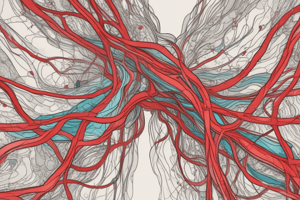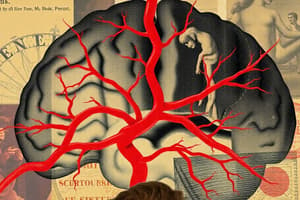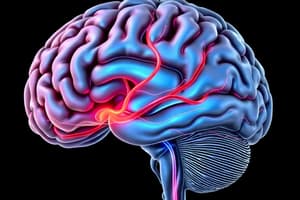Podcast
Questions and Answers
Which of the following statements accurately reflects the relationship between cerebral metabolic rate of oxygen consumption (CMRO2) and brain glucose consumption?
Which of the following statements accurately reflects the relationship between cerebral metabolic rate of oxygen consumption (CMRO2) and brain glucose consumption?
- CMRO2 is normally 3 to 3.8 mL/100 g/min and brain glucose consumption is normally 5 mg/100 g/min (correct)
- CMRO2 and brain glucose consumption are both normally 3 to 3.8 mL/100 g/min
- CMRO2 is normally 5 mg/100 g/min and brain glucose consumption is normally 3 to 3.8 mL/100 g/min
- CMRO2 and brain glucose consumption are both normally 5 mg/100 g/min
What is the normal cerebral blood flow (CBF) in mL/100 g/min?
What is the normal cerebral blood flow (CBF) in mL/100 g/min?
- 75
- 100
- 50 (correct)
- 5
What is the relationship between cerebral blood flow (CBF) and cerebrovascular resistance (CVR)?
What is the relationship between cerebral blood flow (CBF) and cerebrovascular resistance (CVR)?
- CBF is unrelated to CVR
- CBF is equal to CVR (correct)
- CBF is directly proportional to CPP
- CBF is inversely proportional to CVR
What is cerebral autoregulation of blood flow?
What is cerebral autoregulation of blood flow?
What is the lower limit of autoregulation (LLA)?
What is the lower limit of autoregulation (LLA)?
What percentage of total body oxygen consumption is the adult brain responsible for?
What percentage of total body oxygen consumption is the adult brain responsible for?
What is the normal cerebral metabolic rate of oxygen consumption (CMRO2)?
What is the normal cerebral metabolic rate of oxygen consumption (CMRO2)?
What is the relationship between cerebral blood flow (CBF) and cerebrovascular resistance (CVR)?
What is the relationship between cerebral blood flow (CBF) and cerebrovascular resistance (CVR)?
What is the cerebral autoregulation of blood flow thought to remain intact between?
What is the cerebral autoregulation of blood flow thought to remain intact between?
What occurs when cerebral vessels are maximally vasoconstricted and there are increases in perfusion pressure?
What occurs when cerebral vessels are maximally vasoconstricted and there are increases in perfusion pressure?
Flashcards are hidden until you start studying




